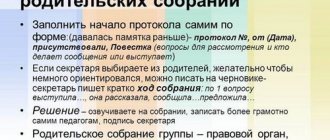FEATURES OF ORGANIZING AND CONDUCTING PARENTAL MEETINGS IN A PRESENTER
Group meetings are held every 2-3 months. 2-3 questions are brought up for discussion (one question is prepared by the teacher, on others you can invite parents or one of the specialists to speak). Every year, it is advisable to devote one meeting to discussing family experiences in raising children. A topic is selected that is topical for this group, for example, “How to teach children to love nature,” “Children’s fears,” “Is the computer a friend or foe in raising children?”
Traditional forms of holding parent meetings in preschool educational institutions
Parent meetings in kindergarten play an important role in establishing interaction between the teacher and parents, as well as between the parents themselves. This is a unique form of feedback, an opportunity to discuss upcoming plans for teaching and raising children in kindergarten and talk about the individual characteristics of children’s development. Teachers also invite specialized specialists to parent meetings: speech therapists, psychologists, methodologists, doctors. They explain to parents in an accessible form what difficulties may exist in the physical, personal, psychological and emotional development of children of a certain age and how to behave at home in order to overcome them. Next, we’ll talk about how to properly prepare and conduct a parent-teacher meeting in kindergarten.
During each school year, kindergarten groups usually hold two or three planned parent meetings. Sometimes it is necessary to hold an extraordinary additional parent meeting if some extraordinary event has occurred in the kindergarten and it needs to be discussed with the parents. When children are preparing for graduation, an additional meeting between the group teacher and parents may be necessary to discuss all the nuances of this event.
The main topics of parent-teacher meetings in kindergarten for the year are related to the peculiarities of the course of the school year.
First parent meeting
It is usually held in September. On it, the teacher meets the parents, if they have not met before, and discusses the long-term work plan for the year. At this meeting, a parent committee is elected, which throughout the school year will help the teacher solve all problems in the group. Also, a methodologist and psychologist are usually invited to the first parent meeting in kindergarten. They talk about the developmental features of children of the corresponding age group and give advice on how parents can study at home with their children to reinforce the material, and how to raise them at home.
Next parent meeting
in kindergarten it is held in the middle of the year. As a rule, this is a period of acute respiratory viral infections, so at this meeting issues of a healthy lifestyle are necessarily discussed: how to harden children, how to protect them from viral respiratory diseases. A doctor may be invited to such a parent meeting so that he can more competently answer questions about the children’s health. Intermediate educational results, the pace of children’s development, and emerging difficulties are also discussed.
MAGAZINE Preschooler.RF
Development of the structure of a thematic parent meetingOlga Petrovna Bashkirova, teacher, municipal budgetary preschool educational institution “Kindergarten of a combined type No. 179”, Samara city district
Over the thousand-year history of mankind, two branches of education of the younger generation have developed: family and public. Family and preschool institutions are two important institutions for the socialization of children. Their educational functions are different, but their interaction is necessary for the comprehensive development of the child. Modern parents are quite literate, have access to pedagogical information, but often they use random literature, unsystematically, and therefore parents’ knowledge is chaotic [1, p. 28].
A positive result can only be achieved by uniting the family and kindergarten into a single educational space, implying interaction and cooperation between preschool teachers and parents throughout the child’s preschool childhood. Based on this, it follows that the issue of interaction between a preschool institution and a family is one of the most pressing today.
The purpose of the parent meeting: coordination and unification of the efforts of the preschool educational institution and the family in creating conditions for the comprehensive development of the child’s personality and improving the pedagogical culture of parents.
Tasks of the parent meeting
- Establish partnerships between teachers, children and parents.
- To help parents understand their educational role in the family, their position in communicating with children within the framework of family education.
- Provide assistance to parents in mastering pedagogical knowledge about the development of a preschool child and the ability to apply it in communication.
- Select methods of influence on the child that are appropriate to his age and individual characteristics.
Pedagogical theory and practice have developed a large number of different forms of working with families. The main form of work between teachers and parents is parent-teacher meetings. During each school year, kindergarten groups usually hold two or three planned parent meetings. Traditional forms of parent meetings are a meeting at which there is a main speaker - a teacher and several co-speakers, specialized kindergarten specialists or representatives of the parent committee. The teacher can also conduct a survey or a short discussion with parents about any issue in the life of the children’s group [2].
The structure of a thematic parent meeting consists of three stages [3].
Stage I - Preparatory
- It is necessary to warn parents in advance about the parent-teacher meeting in kindergarten and about the topic that will be discussed. The teacher should post the date and topic of the parent-teacher conference on the information board. It's even better if each parent receives a personal invitation to a parent-teacher meeting.
- It is necessary to prepare well in advance for the parent meeting. Write a plan, prepare visual and information materials, print out the required number of questionnaires for parents.
- It is necessary to agree with other kindergarten specialists on the topic of the parent meeting, their role at this meeting and give time for preparation.
Stage II – Basic
The first or introductory part is designed to organize parents, create an atmosphere of goodwill and trust, and concentrate their attention (topic messages, forms of meetings using short games and activities).
The second part (disclosure of the topic of the meeting) begins with a speech by the group teacher, senior teacher or other preschool specialists, covering the theoretical aspects of the topic under consideration.
The third part - “miscellaneous” - discusses the issues of keeping a child in kindergarten, spending leisure time, organizing joint events between the family and the preschool educational institution.
The fourth part is the decision; the results of the meeting are summed up, listing the decisions made on each of the issues discussed, recorded in the minutes.
Stage III - Final (reflective)
Summing up, it is important to find out the attitude of the parents towards the meeting, it is wise to prepare in advance the necessary questionnaires for the assessments and wishes of the parents - all this will subsequently become the subject of reflection. The subject of analysis will also have to be the personal composition of parents who remained for a personal conversation, questions from parents during the meeting, the attendance of parents, reasons for absence, participation of parents in the discussion, etc.
When holding a parent meeting, you must follow all stages of its structure. This will help us not only maintain its function, but also convey the theme of the meeting, as well as the comfortable presence of all participants. This way, the parent meeting will be effective.
- Arnautova E.P. We are planning to work with our family. // Management of preschool educational institutions 2002, No. 4. – 66 p.
- Zvereva O. L., Krotova T. V. Communication between a teacher and parents in a preschool educational institution: Methodological aspect. — M.: Sphere shopping center, 2005
- Syagina N.V. Experience of interaction between family and preschool institution // Young scientist. - 2016. - No. 23. — P. 518-521.
| Next > |
Parents' committee in kindergarten: advice from "experienced"
When sending a child to kindergarten, parents have the right not only to learn about his relationships in the team, to be interested in academic success, but also to take an active part in the life of the kindergarten.
Anyone who wants to raise a self-sufficient and harmoniously developed personality, a loving and understanding child, will always find the opportunity to participate in an important stage of his life for the child - the kindergarten period.
In order for parents to be not just observers of the educational process, but also its participants, a parent committee is created. It is designed to resolve issues at various levels with the administration of the preschool institution, as well as with other organizations that provide and monitor the work of the kindergarten. In this case, a parent committee can be created in each group, and a general committee is also formed for the entire preschool institution. The main task of the parent committee is to help teachers create optimal conditions for the presence and development of children within the walls of the kindergarten.
The main responsibilities of the parent committee are:
- Organize and hold unscheduled meetings in the garden to resolve important issues;
- Solve financial issues, raise funds for the needs of the group;
- Assist in organizing repairs in the group and on the general kindergarten territory;
- Organize and purchase gifts for the holidays;
- Participate in organizing events and celebrations;
- The parent committee has the right to influence the activities of the teacher, recommending certain types of work;
- The parent committee has the right to request from the administration of the institution a report on the distribution of kindergarten money;
- They control the work of all employees of the institution and have the right to report detected violations to the relevant structures.
You can become a member of the parent committee only on a voluntary basis. The activities carried out by the committee are quite complex and responsible, and are not suitable for everyone and are not of interest to everyone. If you don't have the desire, don't force yourself to become a member of the parent committee. If possible, you can always offer your help to an already organized group of parents, for example, bring or take away something, etc.
The parent committee is elected by voting at the first parent meeting at the beginning of the school year. As a rule, there are always 3-5 self-nominated people who have enough free time and desire to help teachers organize comfortable conditions for children to stay in kindergarten.
Among them, a committee chairman is nominated who will represent the interests of the group at all general meetings of the garden and before the administration. It is he who conveys to the entire group of parents the information received at the general kindergarten meeting.
The work of the parent committee: an inside view
Meetings of the parent committee take place much more often than parent meetings and are coordinated with the kindergarten administration. But since the committee includes the most active and sociable mothers, they immediately establish contact with each other and meet to resolve issues even more often than scheduled meetings.
In order to organize its activities more clearly, all responsibilities are distributed among committee members.
- Thus, one of the parents communicates with the administration of the preschool institution on pressing issues. He is almost always the chairman of the committee.
- Responsible for financial matters and fundraising.
- The third establishes and maintains contact with other parents.
- The fourth member of the parent committee deals with repairs and other economic issues.
- The fifth parent organizes gifts and actively helps the teacher in organizing children's holidays and birthdays;
The distribution can be arbitrary, depending on the desire and choice of the committee members themselves. In any case, it is recommended to select one person within the committee who will be on hand. This is the person through whom educators will communicate their needs (if you need to draw a poster, print handouts, or what to buy for the group).
Despite the fact that responsibilities are divided between members of the parent committee, all issues are still voiced and discussed collectively, which is necessary to control the intended use of common money. This is the main principle of the committee's work.
For better contact with parents, it is most convenient to create a group in instant messengers (Whats up and Viber) or social networks, where all participants will be invited. This way you can get the information across even to parents who do not attend group meetings.
Financial questions
The main problem of parent committees is raising money. This is the most time-consuming and thankless job. Of course, financial assistance to a preschool institution is voluntary. Not every parent will be happy to give up their money. But the task of the parent committee is to competently justify what and how much money is required. The amount of money collected will depend on how correctly and clearly they convey this need to other parents.
To be honest, not a single kindergarten can do without “voluntary” donations. Funds are needed for gifts for children, for the needs of the group (from toilet paper to office supplies), money has to be collected for theaters and museums.
It is best to calculate and draw up a preliminary estimate for the whole year, and then justify at the parent meeting why it is more convenient to collect such an amount of money at once. You won’t have to catch your parents every time to collect a “voluntary donation” for March 8, February 23, the purchase of stationery, etc., you won’t have to worry about late money, this way you will protect yourself from investing your “hard-earned money” for some reason. then the other parent.
Keep in mind that any parent who has made a contribution to the “common fund” has the right to check the work of the parent committee.
Important:
It is more convenient to keep all the collected money with one person - this will eliminate confusion. To save your nerves at the end of the year, we strongly advise you to keep track of your expenses. Be sure to keep receipts for any purchase, even the smallest one. They will be needed for subsequent reporting to parents about the funds spent.
How to organize everything
First, you need to find out about all the needs of the group: household goods, office supplies, etc. Usually, educators themselves convey such information to the parent committee, but you can play it safe. Based on this, you will decide how much money you need to raise. It is better to ask the teacher to provide you with the entire list of required purchases, indicating their urgency. This way you can pre-plan what to spend the collected funds on first.
Holidays and gifts in the garden
Most of the money collected always goes to purchasing gifts for various holidays: New Year, March 8, February 23, as well as birthdays and graduations. You can discuss and choose gifts at a parent meeting, as well as in a group in messengers. It is important to discuss and agree on a common opinion in advance, and also to clarify whether there are any other parents who want to help the parent committee. Parents of the group can offer you their help: take you to the base to buy gifts, help bring all the gifts to the kindergarten, package candy, etc. But, as practice shows, all issues related to purchasing gifts for children and group teachers have to be resolved independently.
Among the parents in the group, there are always a couple of three who refuse to give money for a gift to their son (daughter). The reasons may be different, and you do not have the right to demand financial investments from them. The only thing you should do is warn parents so that they take care of the gift for their children themselves, so as not to spoil the child’s holiday experience.
What should you be prepared for when becoming a member of the parent committee?
- You will definitely be discussed and judged. Just be prepared for it. It's hard to please everyone, so just try to do your job conscientiously and don't worry if one of your parents didn't like the New Year's gift you bought.
- You will have to constantly seek a compromise between the needs of the garden and the capabilities of the parents. Therefore, learn to politely refuse the teacher’s request, with the support of your parents.
- They will constantly write and call you about various current and “ridiculous” issues.
- You will spend quite a lot of personal time solving group and garden issues.
- You will often be in the role of a loader, since the parent committee will have to deal with the purchase of office supplies, household goods, gifts for children and teachers.
- You will have to do a lot of creative work: draw posters, decorate the halls, come up with scripts, etc.
Despite all of the above, there is no need to be afraid of working in the parent committee.
Be patient. This work is labor-intensive and thankless, but it brings a lot of benefits. By becoming a member of the parent committee, you have a direct opportunity to provide your child with the best conditions for development, education and the formation of a self-sufficient personality. Return to section






